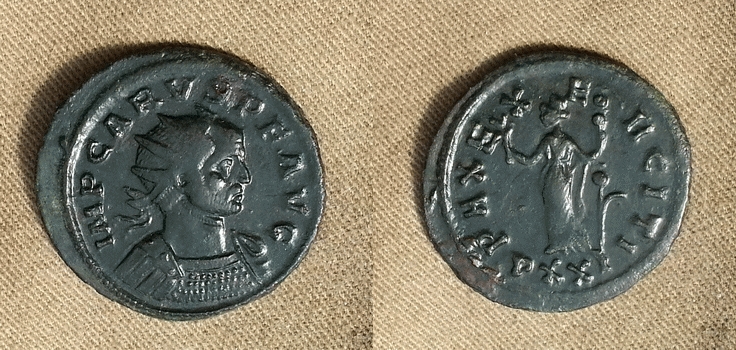
Carus 282 - 283 Antoninianus, Ticinum 1. officina
Obverse: IMP CARVS PF AVG cuirassed bust, radiate
head r.
Reverse: . PAX EXERCITI Pax standing left, holding
standard left. and olive-branch r. exergue: PXXI
RIC V, 75
|
|
Carus (Latin: Marcus Aurelius Carus Augustus; c. 222 – July or August 283)
was Roman Emperor from 282 to 283, and was 60 at ascension. During
his short reign, Carus fought the Germanic tribes and Sarmatians along
the Danube frontier with success. He brought stability in the empire
and died in 283 aged 61.
During his campaign against the Sassanid Empire, he sacked their capital
Ctesiphon, but died shortly thereafter. He was succeeded by his sons
Carinus and Numerian, creating a dynasty which, though short-lived, granted
further stability to a resurgent empire.
Biography:
Carus, whose name before the accession may have been Marcus Numerius Carus,
was likely born at Narbo (modern Narbonne) in Gaul but was educated in
Rome. He was a senator[8] and filled various civil and military posts
before being appointed prefect of the Praetorian Guard by the emperor Probus
in 282.
After the murder of Probus at Sirmium, Carus was proclaimed emperor by
the soldiers. Although Carus severely avenged the death of Probus,
he was suspected as an accessory to the deed. He does not seem to
have returned to Rome after his accession, contenting himself with an announcement
to the Senate.
Campaign against the Sassanids and Death:
Bestowing the title of Caesar upon his sons Carinus and Numerian, he left
Carinus in charge of the western portion of the empire and took Numerian
with him on an expedition against the Persians, which had been contemplated
by Probus. Having defeated the Quadi and Sarmatians on the Danube,
for which he was given the title Germanicus Maximus, Carus proceeded through
Thrace and Asia Minor, annexed Mesopotamia, pressed on to Seleucia and
Ctesiphon, and marched his soldiers beyond the Tigris.
The Sassanid King Bahram II, limited by internal opposition and his troops
occupied with a campaign in modern-day Afghanistan, could not effectively
defend his territory. The victories of Carus avenged all the previous
defeats suffered by the Romans against the Sassanids, and he received the
title of Persicus Maximus.
Carus' hopes of further conquest were cut short by his death, which was
announced after a violent storm. His death was variously attributed
to disease, the effects of lightning, or a wound received in the campaign
against the Persians. The fact that he was leading a victorious campaign,
and his son Numerian succeeded him without opposition, suggest that his
death may have been due to natural causes.
Information was taken from Wikipedia, the free encyclopedia
at this URL:
https://en.wikipedia.org/wiki/Carus
|